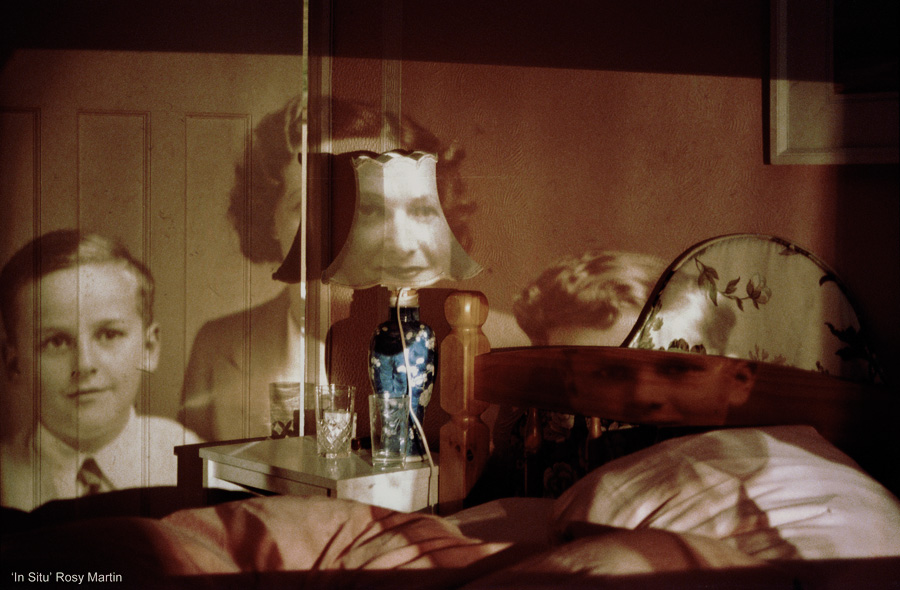This post was written by Dr Silke Arnold-de Simine, Senior Lecturer in Memory and Cultural Studies in Birkbeck’s Department of European Languages and Cultures. There will be a conference held at Birkbeck on 10-11 July on ‘Picturing the Family: Media, Narrative, Memory‘; and an exhibition in the Peltz Gallery from 3-25 July, entitled ‘Family Ties: Reframing Memory‘.

© Rosy Martin ‘In Situ’ will be on display at the forthcoming Family Ties Exhibition at the Peltz Gallery
The family is seen as a privileged site of memory transmission both in terms of the stories which are told and passed down the generations as communicative memory, but also in terms of the unspoken and unspeakable memories which are acted out in families and passed on to children without ever being acknowledged. Marianne Hirsch has introduced the concept of ‘postmemory’, something that Abraham and Torok describe as ‘transgenerational haunting’, the ‘phantom effects’ that haunt the children of parents who have lived through unprocessed traumatic events or repressed and shameful secrets. The concept of ‘transgenerational haunting’ is not simply extended to or replicated on a collective level when the history of the nation is seen through the paradigm of the family: shared phantoms can be externalised and become inscribed in cultural practices in an attempt to ‘relieve the unconscious by placing the effects of the phantom in the social realm’ (Abraham 1994: 176) – phantoms which were never restricted to individuals to begin with but only ever existed in an interpersonal and intergenerational dynamic.
In contemporary commemoration culture the family has become the central trope through which national history is framed. Around the centenary of the First World War we are faced with a remembrance culture which relies in all its scripted rituals, TV programming and exhibition planning on the input of the public who is made to feel that they are provided with a forum for their stories, their family’s personal memories, rather than a top-down version of events. A pan-European website, Europeana 1914-1918, promises untold stories alongside official histories of WW1 and includes digitized documents and film material from libraries and archives but also 90,000 personal papers and memorabilia of some 7,000 people involved in the war, held by their families and digitised at special events – so-called ‘crowdsourcing’ – in 12 countries. It provides access to ‘memories and memorabilia from families throughout Europe’ and users are encouraged to ‘contribute [their] own family history’. That the trope of the family is used to naturalise national alliances is not particularly new, variations on the concepts of ‘fatherland’ or ‘motherland’ can be found in many different languages and cultures, and the institutions of the family and the nation are reaffirmed and reaffirm each other in that process. However, the unpredictability of family stories can also provide an unsettling element and when current European heads of state are given the ‘Who Do You Think You Are? (BBC 1, 2004-) treatment, the results can be difficult to incorporate into an official narrative.
Roughly a year ago the German media reported that German chancellor Angela Merkel’s grandfather, Ludwig Kasner (Kazmierczak), who had been of Polish origin but was drafted into the German Army in 1915, had – after becoming a prisoner of war – joined the Blue Army, a unit that fought for Polish independence on the side of the Entente Powers which meant that he probably took part in fighting against Germany. But rather than using this information against Merkel, the image conscious German press celebrated the fact that this made her the most favored foreign politician in Poland. Merkel’s Polish colleague Donald Tusk also had a ‘grandfather affair’ of his own and knows all to well about the pitfalls of the wrong family history when it comes to the conflicts of the twentieth century. During the national elections of 2005, surveys showed him clearly in the lead, but when it was revealed that his grandfather had fought in the German Wehrmacht he lost to the National-conservative party of Lech Kaczynski.
These examples show that ‘picturing the family’ is an activity that is clearly fraught with unexpected dangers and while it can be used as a conservative and stabilizing force it can also lead to a defamiliarisation of the past and ask uncomfortable questions about the ways we define our identities in ‘imagined communities’ (Benedikt Anderson).
